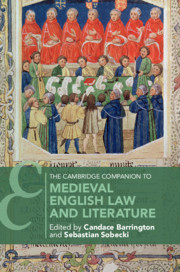Book contents
- The Cambridge Companion to Medieval English Law and Literature
- The Cambridge Companion to Medieval English Law and Literature
- Copyright page
- Contents
- Illustrations
- Contributors
- Abbreviations
- Preface
- Part I Legal Contexts
- Part II Literary Texts
- 7 Treason
- 8 Complaint Literature
- 9 Political Literature and Political Law
- 10 William Langland
- 11 Geoffrey Chaucer
- 12 John Gower
- 13 Lollards and Religious Writings
- 14 Lancastrian Literature
- 15 Middle English Romance and Malory’s Morte Darthur
- 16 Marriage and the Legal Culture of Witnessing
- Index
- References
9 - Political Literature and Political Law
from Part II - Literary Texts
Published online by Cambridge University Press: 26 July 2019
- The Cambridge Companion to Medieval English Law and Literature
- The Cambridge Companion to Medieval English Law and Literature
- Copyright page
- Contents
- Illustrations
- Contributors
- Abbreviations
- Preface
- Part I Legal Contexts
- Part II Literary Texts
- 7 Treason
- 8 Complaint Literature
- 9 Political Literature and Political Law
- 10 William Langland
- 11 Geoffrey Chaucer
- 12 John Gower
- 13 Lollards and Religious Writings
- 14 Lancastrian Literature
- 15 Middle English Romance and Malory’s Morte Darthur
- 16 Marriage and the Legal Culture of Witnessing
- Index
- References
Summary
The proliferation of political complaints, satire and ‘advice’ in poetry and prose surviving from the twelfth century on suggests that medieval England’s steeply hierarchical world was pervaded by political debate and satire, in both of which law, in its tangled conceptual and institutional forms, was a central focus. This is partly because law was crucial to the two most important centres of medieval authority, by which everyone’s lives were in some measure guided: the king and the church. From the Conquest on, those were separate centres of increasingly massive written and unwritten bodies of law, courts and legions of legal professionals, whose numbers grew from the thirteenth century especially. Their proliferation, reliance on payment, and power over those seeking justice but lacking powerful connections or wealth provided fodder for much satire and complaint. Behind institutional systems, some of the fundamental ideas of political authority were paradoxical and continually subject to debate, chief among which was the kind of authority held by the king, clashing with that held by other potentates or wider political representatives, in parliament and elsewhere.
Such writing, whether in Latin, French or – increasingly in the fourteenth and fifteenth centuries – English, often claims to present the voices of ‘common’ subjects of the law, although how truly representative such writing was is ultimately unanswerable. The fiction of constructing politically representative voices in writing, however, has a history and political importance of its own. Thus as well as discussing how the law figures in political writing and political clashes, this chapter will also consider the changing nature of the idea of being a subject of the law, as displayed through the narrators and implied readers of political literature.
- Type
- Chapter
- Information
- The Cambridge Companion to Medieval English Law and Literature , pp. 108 - 120Publisher: Cambridge University PressPrint publication year: 2019

